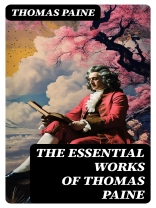In ’The Essential Works of Thomas Paine, ’ readers are introduced to a meticulously curated collection of the pivotal writings that fueled the American Revolutionary spirit and laid the groundwork for modern democratic thought. This compilation showcases Paine’s distinctive prose, characterized by clarity, fervor, and a compelling rhetorical style that resonates with both fervent advocacy and reasoned argumentation. The book spans various themes—ranging from governance, religion, and human rights to social justice—demonstrating Paine’s ability to intertwine moral philosophy with practical political advocacy within the context of 18th-century Enlightenment ideas. Thomas Paine, a pivotal figure in the formation of American identity, was born in England but found his most significant voice in the nascent United States. His tumultuous upbringing and experiences as a customs officer, teacher, and pamphleteer provided fertile ground for his revolutionary ideas. ’Common Sense, ’ arguably his most influential work, along with essays like ’The Rights of Man’ and ’The Age of Reason, ’ not only reflect his commitment to democratic ideals but also reveal his deep disdain for tyranny and dogma, which propelled him to challenge the status quo. ’The Essential Works of Thomas Paine’ is indispensable for anyone seeking insight into the foundational texts that shaped America’s ideological landscape. Academics, historians, and the general reader will find this collection invaluable for understanding the principles of liberty and justice that continue to inspire movements for social change today. Engage with Paine’s bold ideas and discover how his passion for egalitarianism remains profoundly relevant.
Om författaren
Thomas Paine (1737–1809) was an English-born American political activist, philosopher, political theorist, and revolutionary. He is most famous for his influential pamphlets at the start of the American Revolution, particularly ’Common Sense’ (1776) and ’The American Crisis’ (1776-1783), which urged the American colonies to seek independence from Great Britain. Paine’s writing is distinguished by its clear, compelling, and persuasive prose that was accessible to the common citizen, helping to shape the ideological framework for American independence. ’The Essential Works of Thomas Paine’ gathers his most significant works, encompassing his thoughts on democracy, equality, and individual rights that have deeply impacted the development of liberal political thought. Notably, Paine also authored ’The Rights of Man’ (1791-1792) in defense of the French Revolution, and ’The Age of Reason’ (1794-1796), which advocated for deism and criticized institutionalized religion. Paine’s works remain enduring testimonials to his belief in the inherent rights of mankind and his unwavering advocacy for political freedom and social justice. Following his ideas set forth in these publications, Paine’s literary style is characterized by its forthright nature, rhetorical power, and use of common language to appeal to a broad audience, imbuing his works with a timeless quality that continues to resonate in today’s discourse on civil liberties and governance.












